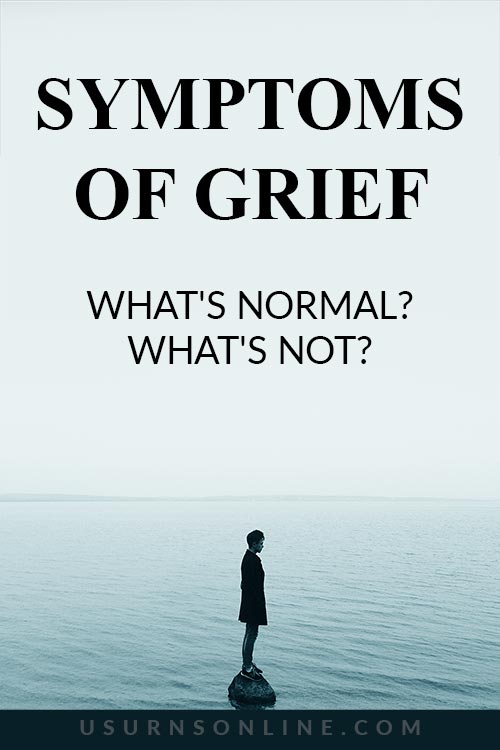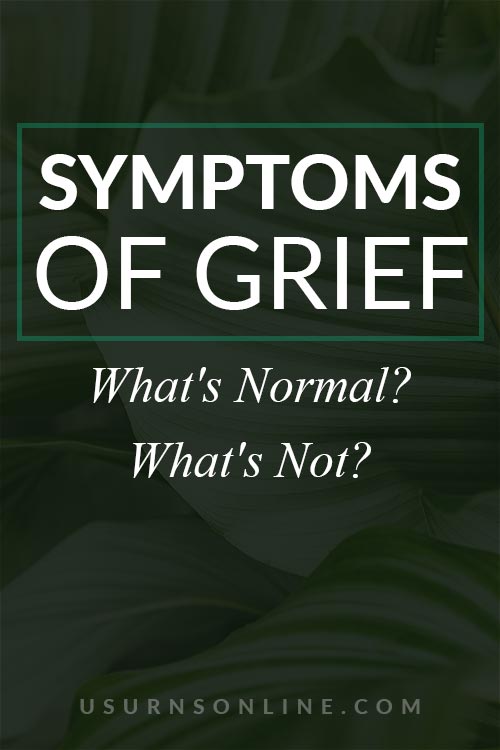Grief can cause damage to your body, physically, emotionally, and spiritually.
How can you tell if what you are feeling is “normal” grief? When should you seek help? How long will you feel like this?
Read on and learn about grief and its symptoms.
Please note: This is not medical advice, and we are not medical professionals. This is our summary of common knowledge and general information on ways that grief can manifest. Please consult your doctor regarding physical and emotional symptoms.
What Does Grief Do to Your Body?
Grief affects you in so many ways. It is surprising how grief can make you feel.
Your heart actually aches. You’re exhausted, but you can’t sleep. Food is disgusting, yet you feel hungry. You might sleep all night but wake up exhausted.
Acute grief can change the heart muscle so much that it causes “broken heart syndrome.” This is a form of heart disease with the same signs as a heart attack.
You will be grieving your past, present, and future that you never got to share.
Does any of this sound familiar?
Physical Symptoms of Grief
What causes these physical symptoms? Grief can worsen the health problems you already have and generate new ones. It can batter your immune system leaving you open to illness.
Urns Made in the USA
Here are some symptoms you may experience after a loss:
- Increased blood pressure
- Heart palpitations
- Increased risk of blood clots
- Sleeplessness
- Headaches and nausea
- Appetite and weight changes
- Muscle weakness
- Increased number of colds or infections
- Tiredness / fatigue
- Energized: Feeling strong or indestructible
Emotional Symptoms of Grief
Stress links the physical and emotional facets of grief. Emotional stress can spark the nervous system as easily as a physical threat can. Research shows that emotional pain can trigger the same zones of the brain as physical pain.
Here are some emotional symptoms you may encounter:
- Emptiness
- Fear
- Guilt
- Relief (and guilt for feeling relief)
- Sadness
- Shame
- Numbness
- Anger
- Shock or disbelief
- Inability to stop crying
Related: Prolonged Grief- 10 Things to Know When You Feel Stuck
When to Consult a Doctor
Feelings of hopelessness and despair are normal when you are grieving – for a time. It’s part of the human condition to struggle before coming to terms with your grief. The time to heal will vary from person to person.
Still, there are signs that you may benefit from counseling or seeking a doctor’s help.
If you are experiencing any of these, please reach out to a professional:
- Thoughts of suicide. Don’t wait. Seek help now. National Suicide Prevention Lifeline 800-273-TALK (8255) or text HOME to 741741.
- Inability to sleep due to your grief. Maybe you’ve never had insomnia before, but now you’re up all hours of the night.
- Not eating properly or looking after your physical hygiene.
- Having intense feelings of guilt. You may feel guilty that you have outlived your loved one.
- Not being able to complete your day-to-day activities. This can affect your job, getting your kids off to school, or any number of things.
- Having hallucinations of your loved one. The term “bereavement hallucination” refers to auditory or visual hallucinations of your deceased loved one.
Even if you’re not experiencing those specific grief symptoms, you might truly benefit from professional counseling or a support group.
Seeing a doctor, counselor, or therapist (or attending a group) is no mark of shame or failure. As humans, we are designed to live, learn, thrive, and mourn in community, so don’t think that you need to go at this alone.
How to Cope with Grief
There are steps to take that can help you cope with your grief.
- Don’t ignore your pain. Face your grief and deal with it.
- Accept your loss. Accepting is not forgetting.
- Cry. Crying doesn’t mean your weak; it is a normal response to your loss.
- Take care of yourself physically. Exercise; walk, bike ride, or join a gym.
- There is no specific time frame for grieving. Everyone is different. Try not to rush yourself.
More tips here: How to Grieve Well
Common Stages of Grief
Everyone will go through grief at some point, whether you have lost a loved one, a job, a marriage, or a dream.
You won’t all go through each stage of grief, and you won’t go through them in order. You may even repeat one or two of them.
- Shock and denial. This is a state of unbelief and numbed feelings.
- Pain and guilt. You may feel that your loss is unbearable. You might feel that you are making other people’s lives harder because of your feelings and needs.
- Anger and bargaining. You may lash out, telling God that you’ll do anything He asks if He’ll only grant you relief from these feelings.
- Depression. This may be a period of loneliness. You are processing your loss.
- The upward turn. This is where the stages of grief like anger and pain are dying down. You’re left in a more calm and relaxed state.
- Reconstruction and working through. You can begin to put the pieces of your life back together and start to move forward.
- Acceptance and hope. This is a gradual acceptance of the new way of life and a feeling of hopefulness in the future. It doesn’t mean you have forgotten your loved one. It means being willing to start living again.
The classic model describes five stages of grief, and we have seven listed above. Others have identified up to twelve distinct aspects of the grief experience.
You may experience all twelve stages, or only a handful. You might also go through the same few on repeat. Don’t worry – this, too, is normal.
Grief Is Personal
That’s because the journey of grief is personal. No two people will grieve in the same way.
It’s personal, so you mind and body will be affected. Don’t worry when you experience some of these symptoms, but at the same time know when it’s time to get help.
While much of your journey will be private and internal, there is a communal aspect to grief as well. Allow friends and family in your life who you can talk to, and who will let you know if anything seems “off” with you. That’s what friends are for!
There is no timeline for this type of sorrow. Chances are, you will grieve (at some level) for the rest of your life. No matter how much time you’ve had with your loved one, you will always want more.
It is ok to care for yourself right now, and it’s ok to think deeply and often about your loved one.
- Mourn deeply
- Be honest with yourself and others
- Give yourself time to heal
- Take care of yourself
- Allow others to help and support you
- Get help when you need it
- Write or journal about your loved one and what you are feeling
- Find ways to honor your loved one’s memory
- Read about grief and loss (whole books or brief, bite-sized selections)
- Continue to remember and treasure the time you had
Pin It





